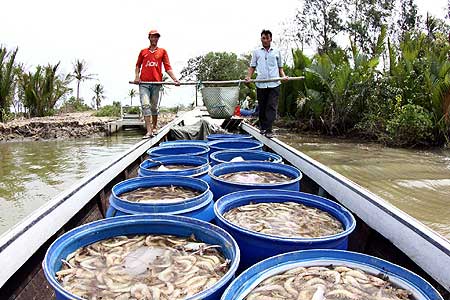
|
| Shrimp harvested in Dam Doi district, Ca Mau Province. |
WWF-Viet Nam and the Thua Thien - Hue Department of Industry and Trade jointly organised the conference, which was attended by some 50 participants from the central provinces of Quang Tri, Thua Thien - Hue, Quang Nam, and Da Nang City.
It was held under the framework of the UK-supported "Central Region Energy Efficiency and Sustainable Energy Planning Capacity Building Project."
The Cao Trieu prawn farming area was selected for piloting the sustainable energy development programme since prawn farming accounts for the second largest electricity consumption in the district.
Following the energy baseline development and assessment of feasible actions, three actions have been proposed in consultation with local farmers for the energy efficiency plan.
They are the establishment of an energy service group to provide information and energy services to local farmers, replacement of three water pumps, and replacement of diesel motors with electrical ones for the pond activities of at least 16 households.
The pilot plan targets reducing energy consumption in the Cao Trieu prawn farming area by 20 per cent by 2015, thus reducing not only farmers' energy expenditure but also emission of greenhouse gases from farming.
Nguyen Duy Thanh, deputy director of the Thua Thien -Hue Department of Industry and Trade, said: "We would like to promote sustainable energy use in various productive activities across the province.
"If the project succeeds in helping local people use energy sustainably and creating good income in Quang Cong Commune, we will consider replicating the model across Thua Thien - Hue."
At the conference, the Energy Alliance of Non-State Actors Viet Nam and Carbon Trust (UK) spoke about their experiences in energy planning and sustainable energy development in Thai Binh Province and the UK respectively.
Commenting on the role that government authorities can play, Tom Cumberlege, a Carbon Trust consultant, said: "Public sector bodies consume lots of energy through the delivery of their services.
"Implementing energy efficiency measures helps save money and meet their public responsibility to use public funding wisely.
"Given the challenges for future energy demands of Viet Nam's growing economy and our expertise in lower carbon energy solutions, we have been thrilled to exchange the experience of UK local governments on this crucial topic."
The CESEP is funded by the British embassy in Viet Nam and seeks to support capacity for local sustainable energy planning and facilitate collaboration between authorities, businesses, and civil society in central Viet Nam.
Source: VNS